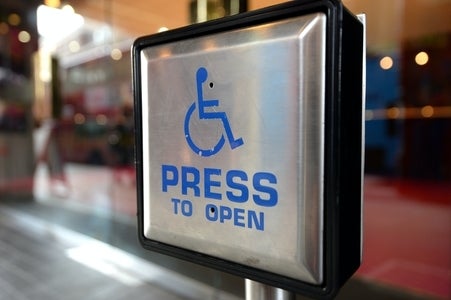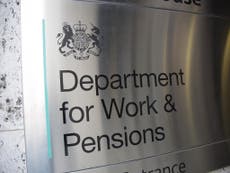MPs call for inquest into treatment of disabled people during pandemic
ONS data shows disabled people made up around 60 per cent of deaths in first wave

Your support helps us to tell the story
From reproductive rights to climate change to Big Tech, The Independent is on the ground when the story is developing. Whether it's investigating the financials of Elon Musk's pro-Trump PAC or producing our latest documentary, 'The A Word', which shines a light on the American women fighting for reproductive rights, we know how important it is to parse out the facts from the messaging.
At such a critical moment in US history, we need reporters on the ground. Your donation allows us to keep sending journalists to speak to both sides of the story.
The Independent is trusted by Americans across the entire political spectrum. And unlike many other quality news outlets, we choose not to lock Americans out of our reporting and analysis with paywalls. We believe quality journalism should be available to everyone, paid for by those who can afford it.
Your support makes all the difference.MPs are calling for an inquiry into the treatment of disabled people during the pandemic.
The Women and Equalties committee published a 53-page report based on three sub-inquiries, which criticised the government’s treatment of those with a disability as the country grappled with the spread of Covid-19.
The report highlights inaccessible communications during government briefings, health and social care funding and the lack of support provided to deaf people when dealing with the barrier of face masks.
The report described the government’s definition of people as “clinically extremely vulnerable” – those needing to shield – as “rational from a medical perspective” but an “inappropriate proxy for the need for support”.
MPs recommended that the government ensures local support arrangements for free food delivery, and said local retailers should make reasonable adjustments so that shielding people are able to shop for essentials safely.
The report also notes the Do Not Attempt Resuscitation (DNAR) scandal, wherein blanket DNAR orders were placed on people with learning disabilities and underlying conditions when they were admitted to hospital, without the consent of them or their families.
Poor communication was cited as a barrier for disabled people, with the lack of sign language at televised government briefings and inadequate support for deaf and hard of hearing people who lip read and struggle with introduction of face masks.
The report said: “The government has been far too slow to address concerns about inaccessible communications during the pandemic, notably about the lack of British Sign Language (BSL) interpretation of government television briefings.”
Speaking to The Independent, Lynn Stewart-Taylor, the founder of the #WhereIsTheInterpreter campaign to get the government to implement BSL interpretation, said: "Due to the lack of provision, sign language users are missing out the critical information. Sign language save lives.
"This is critical action that needs to be done. Nothing has changed since we brought our request to the government. They are not listening to us. We are being treated unfairly."
The report also recommends an additional £211m for students with special educational needs in mainstream schools to allow for “catch-up support”.
ONS data shows disabled people made up around 60 per cent of the deaths during the first wave of the pandemic.
Committee Chair Conservative MP Caroline Nokes said: “Disabled people who already faced substantial barriers to equal participation in society have suffered a range of profoundly adverse effects.
"They have faced problems with unequal access to food, and potentially discriminatory practices in health and social care services.
"Existing systemic problems in education for children and young people with special educational needs have worsened.
"The government has been far too slow to address concerns about engagement and communications: we need genuinely effective mechanisms by which disabled people can influence policies and practices which affect them, and ensure that hard-won rights and equalities are not eroded.
"Our inquiry heard extensive evidence from disabled people of the profoundly unequal adverse effects: our report makes the case for an independent inquiry into the causes.”



Join our commenting forum
Join thought-provoking conversations, follow other Independent readers and see their replies
Comments